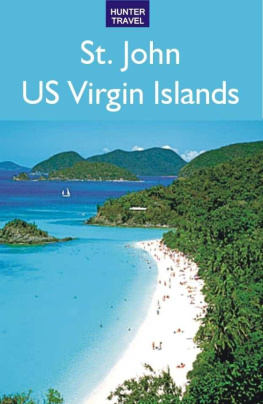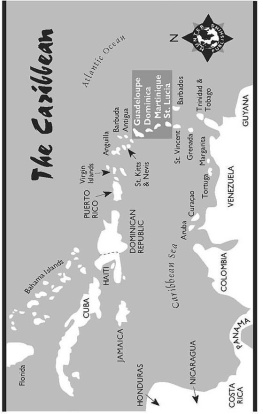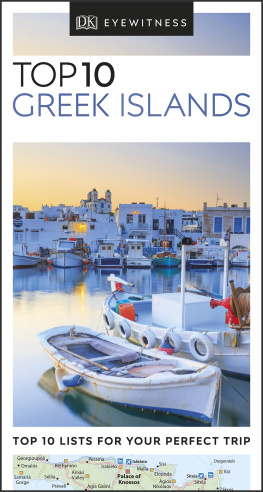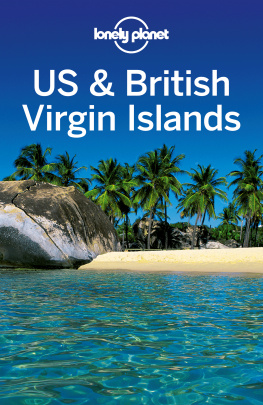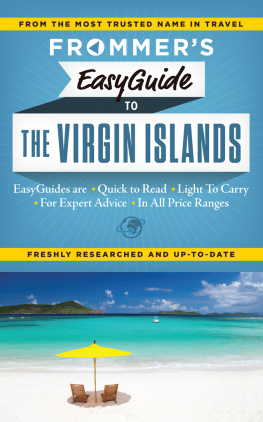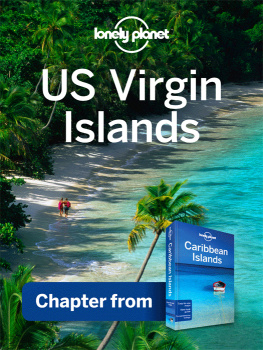St. John Virgin Islands
Lynne Sullivan
HUNTER PUBLISHING, INC,
www.hunterpublishing.com
Ulysses Travel Publications
4176 Saint-Denis, Montral, Qubec
Canada H2W 2M5
514-843-9882, ext. 2232; fax 514-843-9448
Windsor Books
The Boundary, Wheatley Road, Garsington
Oxford, OX44 9EJ England
01865-361122; fax 01865-361133
Lynne M. Sullivan
All rights reserved. No part of this publication may be reproduced, stored in a retrieval system, or transmitted in any form, or by any means, electronic, mechanical, photocopying, recording, or otherwise, without the written permission of the publisher. Brief extracts to be included in reviews or articles are permitted.
This guide focuses on recreational activities. As all such activities contain elements of risk, the publisher, author, affiliated individuals and companies disclaim any responsibility for any injury, harm, or illness that may occur to anyone through, or by use of, the information in this book. Every effort was made to insure the accuracy of information in this book, but the publisher and author do not assume, and hereby disclaim, liability to any party for any loss or damage caused by errors, omissions, misleading information or potential travel problems caused by this guide, even if such errors or omissions are a result of negligence, accident or any other cause.
Maps by Kim Andr & Lissa K. Dailey unless noted otherwise
Hunter Publishing, Inc.
About the Author
Lynne Sullivan is passionate about Caribbean islands. As the author of a dozen best-selling travel guides to islands throughout the eastern Caribbean, she spends much of her time hopping from one place to another scouting out a variety of activities, attractions, shops, accommodations and restaurants. Her goal is to steer independent vacationers on any size budget to the best each island has to offer.
When she's not in the Caribbean, she keeps readers posted with regular updates and new information on her website, www.caribbeanguide2.com.
www.hunterpublishing.com
Hunter's full range of guides to all corners of the globe is featured on our exciting website. You'll find guidebooks to suit every type of traveler, no matter what their budget, lifestyle, or idea of fun.
Adventure Guides - There are now over 40 titles in this series, covering destinations from Costa Rica and the Yucatn to Tampa Bay & Florida's West Coast, Rome and the Alaska Highway. Complete information on what to do, as well as where to stay and eat, Adventure Guides are tailor-made for the curious traveler, with a focus on cultural and physical adventures - dance lessons, hiking, biking, language courses, canoeing, horseback riding, skiing, watersports, festivals and all other kinds of fun.
Alive Guides - This ever-popular line of books takes a unique look at the best each destination offers: fine dining, jazz clubs, first-class class hotels and resorts. In-margin icons direct the reader at a glance. Top-sellers include The Cayman Islands, St. Martin & St. Barts, and Aruba, Bonaire & Curaao.
One-of-a-kind travel books available from Hunter include Best Dives of the Caribbean; A Traveler's Guide to the Galapagos Islands; London A-Z and many more.
Full descriptions are given for each book, along with reviewers' comments and a cover image. You can also view the table of contents and sample pages. Books may be purchased on-line via our secure transaction facility.
- The Islands
- A Dozen Reasons to Visit
- Tips on Using This Book
- A Historical Timeline
- The Islands At A Glance
- Location
- USVI
- BVI
- Climate
- Wildlife
- Birdlife
- Plants
- Coral Reefs
- When to Go
- Island Celebrations
- Travel Documents
- Passports & Paperwork
- Customs & Duty-Free
- Allowances
- Getting There
- AIRLINE CONTACT INFORMATION
- INTERNATIONAL AIRLINES
- REGIONAL AIRLINES
- Island Hopping
- Getting Around
- By Car
- Island Driving Signals
- By Taxi
- By Bus
- Accommodations
- Dining
- Money Matters
- Time
- Taxes
- The US Virgin Islands
- St. John
- Overview
- Getting There
- By Ferry
- From St. Thomas
- From the BVI
- Getting Around
- By Car
- By Bus
- By Taxi
- Touring the Island
- Guided Tours
- Independent Four-Wheel-Drive Tour
- Adventures on Water
- Best Beaches
- North Shore Beaches
- South Shore Beaches
- Scuba Diving & Snorkeling
- Dive Operators
- Snuba
- Boating & Sailing
- Scheduled Cruises
- Charter Boats
- Fishing
- Parasailing, Windsurfing & Kayaking
- Adventures on Foot
- Hiking
- Tennis
- Golf
- Adventures on Wheels
- Biking
- Shopping
- Cruz Bay
- Mongoose Junction
- Wharfside Village
- Dockside Building
- Coral Bay Area
- Where to Stay
- Rental Agencies
- Prices
- Resorts
- Campgrounds
- Where to Eat
- Cruz Bay
- Coral Bay
- East End
- Around the Island
- Nightlife
- Cruz Bay
- Coral Bay
- Island Facts & Numbers

Coral Reefs
A reef is a living community of various organisms and must have sunlight, oxygen and food to survive. The reef itself is a rock-like structure built from coral and algae. Worms, fish and other sea creatures break down and rearrange the growth, creating a more solid base for additional development. Reefs grow slowly, and "branches" of the structure may increase by only three or four inches each year. Large brain corals are often hundreds of years old. Unfortunately, careless swimmers, divers and boaters often cause harm to the easily-damaged reefs through carelessness.
Many animals live on and around a reef, including moray eels, starfish, urchins, crabs, sponges, lobsters and anemones. Coral reefs often draw parrotfish, tangs, snappers, angels and squirrel fish.
- FACT: Coral polyps feed at only during the night. They gather food by extending tentacles from their skeletal homes to capture plankton from the water.
Reefs develop best when water temperatures are between 70 and 80. Most sand is actually tiny fragments of broken-down coral that are carried to shore by waves, tides and currents. When reefs are prevented from growing and breaking down naturally, there is no new sand, and, therefore, no replenished beaches. Reefs also defend beaches from powerful ocean waves. Coasts that are not protected by reefs are usually rocky and craggy.
- TIP: You can see a natural coral reef without getting wet at Coral World on the north coast of St. Thomas.
Serious nature lovers will want to order a copy of Island Peak to Coral Reef from the University of the Virgin Islands, written by researchers Toni Thomas and Barry Devine. Available at island bookstores and by mail from the university. tel. (340) 693-1057, pr@uvi.edu.
When to Go
Everyone imagines being on a Caribbean island during the winter when the weather is miserable most everywhere else. While winter is an ideal time to visit the Virgin Islands, summer, spring and fall have advantages, too.
Island Celebrations
Since temperatures remain steadily in the 80s year-round, smart travelers often prefer to come here during the summer off-season, when more bargains are available. The islands celebrate a variety of holidays and events during the April-October off-season. For the exact dates of specific festivals and celebrations, contact the government tourist offices listed in the Island Facts & Numbers section at the end of each island chapter.

